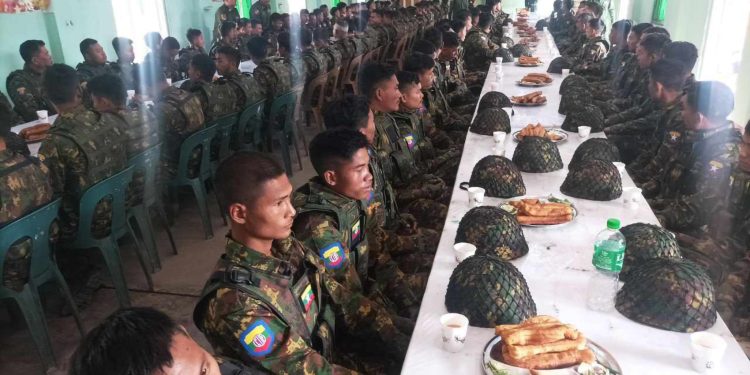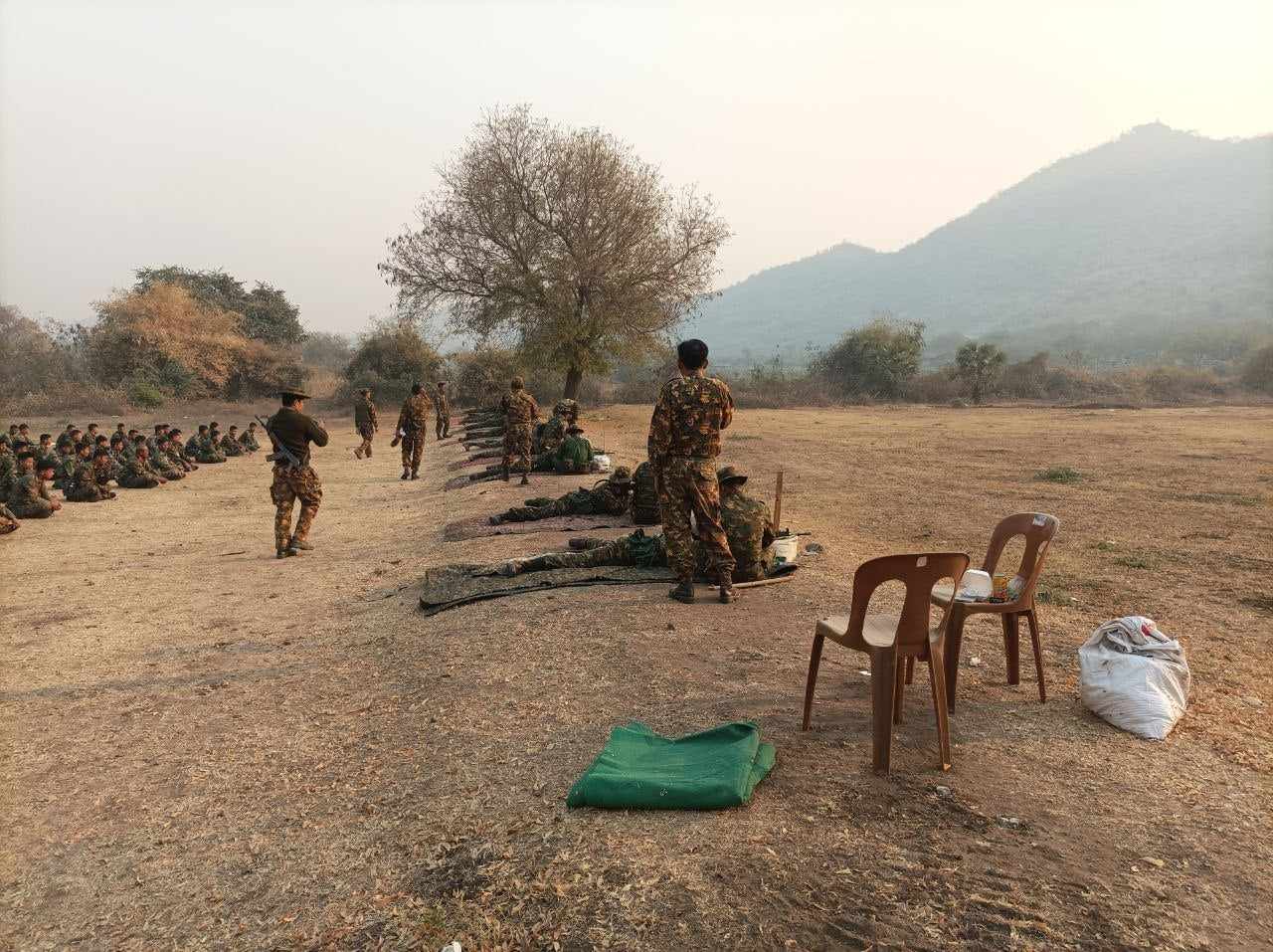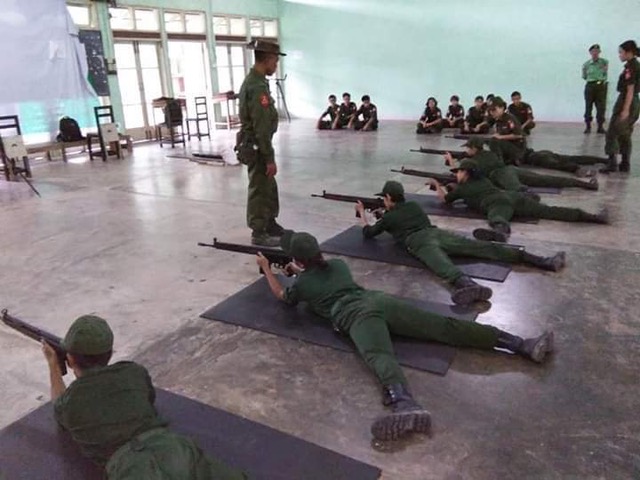
New recruits of a militia group organized by the junta in Mandalay are seen during training. / CJ
Junta administrators are abusing the conscription law to extort money from civilians as the forcible recruitment of young people gets underway in many cities including Yangon and Mandalay.
Last week, junta-appointed village and ward administrators started collecting the personal details of people eligible to be drafted into the military. And in some places, administrators have already started selecting persons randomly or holding draws from lists of those eligible to be drafted, creating opportunities for officials to extort money from those looking to avoid conscription.
Since then, many cases of extortion have been reported across the country, with individuals claiming that the regime’s administrators, General Administration Department staff, police and junta officials involved in the conscription process are demanding money from citizens, exploiting the fear and uncertainty prevailing in the country.
The amount of money being extorted from the families and parents of people on conscription lists differs from one ward to another, as does the number of people being called up for service.
When they reached the office, they were asked to pay 2 million kyats (about US$960) in exchange for their son not being drafted. It was explained that they would have to pay 1 million kyats to the military commander in charge of security for the area, with the remainder to be shared between the GAD, police department and administrators.
“You know, this is happening even in a downtown area. They are doing this extortion blatantly; they don’t care who knows,” said Maung Kaung’s father.

He said he had discussed the issue with other parents but had not yet decided whether to pay the amount requested.
In a few other townships in downtown Yangon, residents said they are discussing with administrators how to find volunteers to fill the numbers required by the regime for drafting into the military. They plan to pay compensation to those volunteers serving in place of the eligible residents.
“They will conduct a draw among those who have passed the medical test; they said it will be done at the end of this month,” said Daw Ni Ni, whose 25-year-old son is on the list.
She said parents are being squeezed for money by the police and ward administrators, who say they can arrange for their sons to fail the medical tests at a price of 400,000 kyats per young man.
In a ward in Yangon’s North Dagon Township, an administrator said only 10 young men will be selected for this round while an administrator in a neighboring ward said all those aged between 24 and 30 would have to serve.
Aside from engaging in extortion, administrators, police and military officers are warning families they will seal or burn down their houses, or arrest the parents, if an eligible young man attempts to evade the draft in Yangon and Bago regions.
On the other hand, in some wards in townships where administrators have previously been targeted by resistance attacks, the administrators don’t dare to engage in extortion and are afraid even to summon those on the conscription lists.
A resident of Yangon’s Thingangyun Township said the administrator in their ward was afraid to summon people and asked residents to help recruit the required number of draftees for the ward.
He said the ward administrator said the families of volunteers would be provided with 400,000 kyats and a sack of rice each while the draftees underwent four months of military training.
“Those who claimed to be military supporters should be the first [to serve in the military] but we cannot find them anywhere now.”
In another ward in Thingangyun, however, the situation is very different, with the administrator there seeing his wallet stuffed by parents to the tune of 50,000 kyats per young man since March 15.
The extortion and forcible attempts at conscription underscore the widespread human rights violations and systematic oppression inflicted by the regime since its seizure of power in February 2021.
Some families, such as that of U Han in a village in western Bago Region, are now rushing to send their sons as far as possible from the junta regime administrators tasked with collecting the data that will form the basis for the drafting process.

U Han’s son is 25 and the administrator asked for 500,000 kyats on March 13. After selling a motorcycle and adding some of his savings, he was able to pay the money to the administrator. But he still doesn’t feel safe.
Therefore, he sent his son to relatives in Yangon and the boy is now seeking ways to get a job in a factory in Thailand. He plans to leave the country as soon as he has secured a job and the necessary visa.
Therefore, the administrators decided to find six men for an entire year. Daw Sein Sein said she asked the ward administrator not to draft her son, 34, so that he could continue to support her and his father, as they are elderly. The ward administrator agreed and requested 10,000 kyats.
But on the next day, the administrator came back and said that high-ranking officers from the military and administration told him that Sein Sein and her husband have four children, so the son would not be among those allowed to avoid the draft.
However, the administrator in Sein Sein ward eventually found six volunteers to be sent this year—including some who were unemployed and homeless—and the son did not have to serve, at least for this round of the draft.
Sein Sein said the administrator ordered households that included eligible young men to donate 10,000 kyats per volunteer, totaling 60,000 kyats.
There are hundreds of households in that ward alone, so if each household with an eligible young man paid 60,000 kyats, that would add up to tens of millions of kyats. Residents don’t know exactly how much of that would be given to volunteers and how much will line the administrators’ pockets.
“I feel bad for the volunteers as well. I feel like the money the administrators ask of us is like an advance payment for their funeral service,” said Sein Sein.
U Naing, a Yangon resident, remarked that by enforcing the conscription law, the junta has not only pushed millions of people into further trouble but also opened new ways for its forces and staff to earn money.
“This is the time for the resistance bodies, especially the urban guerrilla and defense forces in rural areas, to show their might by taking effective action against the administrators and others involved in this process,” said U Naing.
Resistance groups across Myanmar have warned junta officials to halt forcible military recruitment or face severe consequences.
